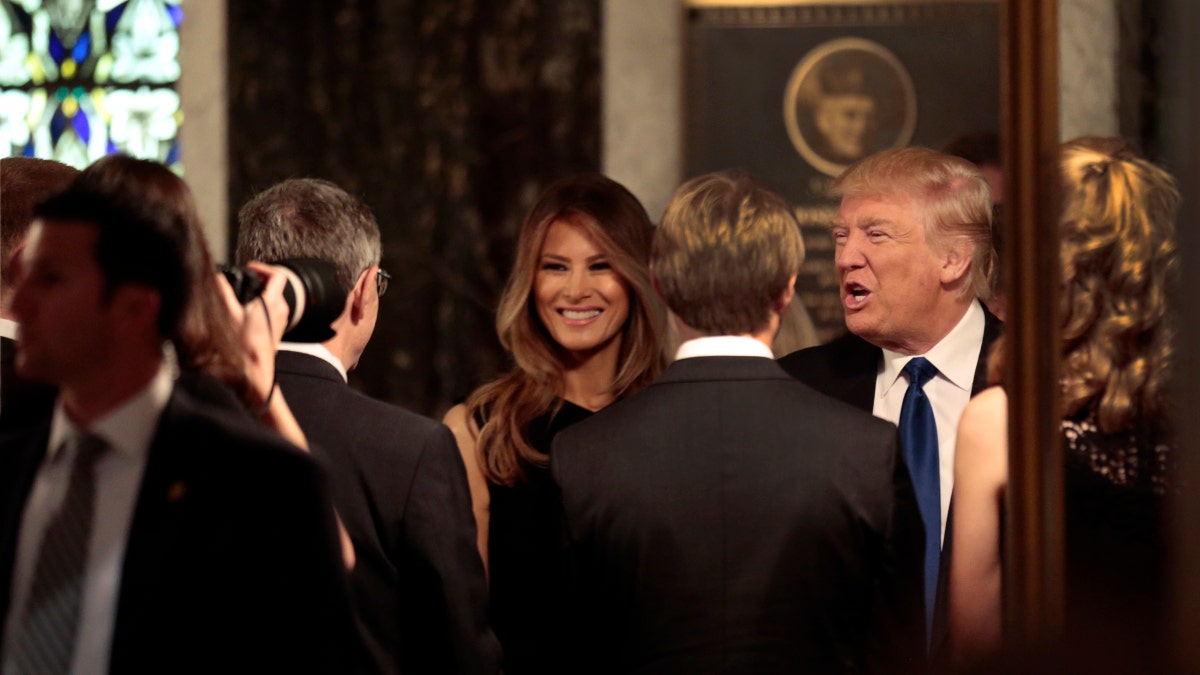
FILE - Republican presidential candidate Donald Trump and his wife Melania meet with family members of Phyllis Schlafly before the start of a funeral Mass for Schlafly, Saturday, Sept. 10, 2016, in St. Louis. (Robert Cohen/St. Louis Post-Dispatch via AP, Pool))
The New York Times is in trouble, and they know it. The paper has lost all credibility, and even long-time readers comfortable with its editorial bias have been sickened by the all-out trashing of Donald Trump over the past several months.
When the publisher of the world’s most arrogant and all-knowing newspaper puts out a mea culpa promising to “rededicate ourselves to the fundamental mission of Times journalism” you can be pretty sure that something is awry. To pledge to “report America and the world honestly, without fear or favor” suggests they have been doing otherwise, and that is a fact.
That said, nothing seems to have changed at the Times. The reporting still is admiring of all-things Obama and derisive of all things Trump, to a laughable degree.
A case in point: an article in the Sunday Styles section last weekend about how fashion “designers fret that their warm reception during the Obama years may be over.” The thesis is this: that Hillary Clinton would likely have been more of a fashion icon and admirer while in the White House than Melania Trump, former model. Seriously.
This piece is worth reviewing because it is so outlandish, and buttresses the case that the Times’ editorial position overshadows reporting in all sections.
It is authored by authoritative fashion writer Vanessa Friedman, who knows better but who has adopted the political persuasion of her bosses, and undermined her own credibility in the process.
Surely she knows that Melania could become one of our country’s great style icons and that Hillary’s penchant for single-hue pants suit was a default mechanism, not a fashion statement.
A recent piece by Michael Cieply, who formerly worked at the single-hue Times for 12 years as a writer and editor, gives some insight into why the paper is such a Johnny-one-note. He says the “New York Times has always — or at least for many decades — been a far more editor-driven, and self-conscious, publication than many of those with which it competes.” Other papers, Cieply says, are “reporter-driven (and) bottom-up”, with editors asking reporters “What are you hearing? What have you got?” By contrast, the Times is strictly top-down. Even in the fashion section!
Ms. Friedman nearly waxes poetic about Hillary’s Ralph Lauren pants suits, and especially the dark grey (with purple lapels) number she wore the morning of her concession speech. It “underscored”, writes Ms. Friedman, “the way two colors/factions – red and blue – can unite to make something new.”
Or, it might have underscored that Hillary had cycled through every other color in the Pantone universe as she barreled through each day of the campaign wearing the exact same garment. If a lot of women followed her lead, the fashion industry would promptly go under. But I digress.
Hillary’s costume choice might also underscore, says Ms. Friedman, “the end of fashion’s seat at the power table.” The author explains that most fashion editors and designers were up to their necks in the Clinton quest, hosting fundraisers and publicly endorsing the Democrat candidate. They are, of course, disappointed.
But will that hamper their business or even their access to the White House? Friedman writes wistfully about how Michelle Obama delighted fashion people by elevating “the industry beyond the superficial to the substantive. She framed clothing as a collection of values: diversity, creativity, entrepreneurship” – a trend that Ms. Friedman worries the Trumps will not carry forward.
The crime, apparently, is that the Trumps have “ignored” fashion designers. (Kind of like the press being outraged when the Trumps dump the press corps to have a family dinner. The nerve!) Even worse: Melania’s wardrobe appears bought “off the rack, as opposed to one that she had worked with the designer to create.” Literally.
Friedman moans that the clothes worn by Mrs. Trump on the campaign trail evolved from a “shopping spree, as opposed to a strategic plan” which “reflects her distance from the industry.” Friedman is also offended that the incoming first lady sometimes has worn foreign designers like Fendi and Balmain.
Actually, maybe it reflects that Melania is not all-consumed with her appearance and has not had a lot of free time lately. Of course, Ms. Friedman is party to a long-standing double standard. Remember how Nancy Reagan was excoriated by the press for wearing expensive clothes designed for her by Adolfo and Carolina Herrera? But how Jacki O got a pass when she wore (foreign designers) Chanel and Dior?
I’m only hitting the high points; the entire article is nonsensical. She quotes one designer saying the only unifying theme about the Trump wardrobes on election night was that they all had dressed in clothes that made them look “rich.” Well, that’s often the case when you are rich.
Friedman tried and apparently failed to find a designer who would refuse to dress Mrs. Trump. What a shock. Designers actually want to make money; dressing one of the most beautiful women to ever occupy the White House would not only be a privilege, it could launch a career.
Ms. Friedman is, like so many other elites in the arts and publishing worlds, shocked that Hillary lost (in spite of her bold fashion statements!) Stefano Tonchi, editor of W, sums up the misery, saying it “makes you realize how powerless we are.”
Yes, Ms. Friedman, you couldn’t overpower the voices of all those unkempt millions who need jobs and are fed up with the insufferable moral superiority of the Left. Maybe now you should go back to writing about fashion, and leave the political commentary to the editorial board.
